|
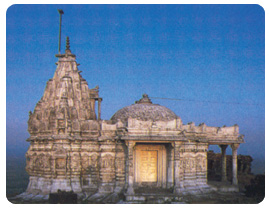 Domestic
flight luggage: Prior to boarding your domestic
flights in India as you leave the main terminal, please
ensure that you "identify your checked baggage".
To do so, ask the airline representative where you need
to actually identify the baggage that you have checked
for your specific flight. Failure may mean that your
checked baggage will not be put on the flight. Unfortunately,
this process is not followed by all airlines and at
all departure points, so make it a good and safe practice
to ask for where you should identify your checked luggage
just prior to boarding any flight. Domestic
flight luggage: Prior to boarding your domestic
flights in India as you leave the main terminal, please
ensure that you "identify your checked baggage".
To do so, ask the airline representative where you need
to actually identify the baggage that you have checked
for your specific flight. Failure may mean that your
checked baggage will not be put on the flight. Unfortunately,
this process is not followed by all airlines and at
all departure points, so make it a good and safe practice
to ask for where you should identify your checked luggage
just prior to boarding any flight.
Currency and Exchange Rate: The local currency
in India is a Rupee abbreviated as Re. or Rs. The Rupee
is further divided into 100 paisa, but since the value
of the paisa is so small, it is hardly ever used. Internationally,
within currency transactions, it is also abbreviated
as INR. The exchange rates floats and has recently been
varying between Rs. 40 and Rs. 50 to a US Dollar. For
sake of first approximation and ease of calculation,
consider assuming that the rate is Rs. 50 to a US Dollar,
and thus Rs. 10 is 20 US cents, and Rs. 100 is US $
2.
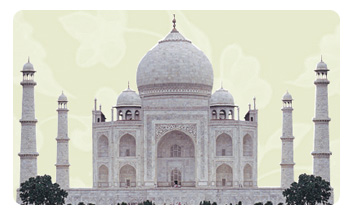 Clothes:
If you are planning to wear full length clothes
during your walking tours, then make sure that they
do not drag on the floor since streets can be dirty
and wet. You should not wear clothes that are very loose
because they can get caught in protruding stones and
surrounding bushes. Bring light rain gear. Consider
bringing, as a minimum, one "Tee" shirt, one
"heavy" flannel type shirt and one light jacket.
This will allow you to wear layered clothing for a variety
of ambient temperatures. Clothes:
If you are planning to wear full length clothes
during your walking tours, then make sure that they
do not drag on the floor since streets can be dirty
and wet. You should not wear clothes that are very loose
because they can get caught in protruding stones and
surrounding bushes. Bring light rain gear. Consider
bringing, as a minimum, one "Tee" shirt, one
"heavy" flannel type shirt and one light jacket.
This will allow you to wear layered clothing for a variety
of ambient temperatures.
Shoes: When you visit places of worship, you
will need to take off your shoes prior to entry. You
are free to wear your socks, but may find that the floor
is wet, thus it may be prudent to take off your socks
also. Make sure that you bring comfortable and well
supporting walking shoes. You will be walking a lot
in the ruins of old temples and forts, and they normally
do not have a clean and clear path with upturned stones,
and steep narrow and broken steps.
Telephones: It is best to make local, national
and International telephone calls from manned public
booths, marked "STD/ISTD", and all identified
with a bright yellow sign. Amount payable is presented
in an electronic form. You would pay cash (any denomination,
since it is not a machine) at these locations. Do not
make phone calls from your hotel as they have exorbitant
phone-call rates. The country code for making calls
into India is +91.
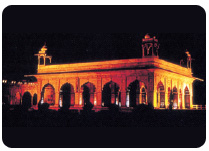 Leather-wear:
There are some Hindu temples that demand that you do
not take any leather goods such as belts, wallets and
leather bags inside the temple. Therefore it is customary
to take off ones belt and certainly not wear a leather
jacket. Both men and women will need to cover their
heads prior to entering a Sikh place of worship. Leather-wear:
There are some Hindu temples that demand that you do
not take any leather goods such as belts, wallets and
leather bags inside the temple. Therefore it is customary
to take off ones belt and certainly not wear a leather
jacket. Both men and women will need to cover their
heads prior to entering a Sikh place of worship.
Accessories: Consider bringing your swimming
trunks, air brush to clean the dust from your cameras
and lens, a telephoto lens if your camera supports one,
lots of clean wipes for your face and hands because
of the dust. Traditional 35 mm film is available in
plentiful, however the new Advantix type is not freely
available.
Document safety: Prior to start of your journey; send
yourself an e-mail with all important passports and
other numbers. Thus should you lose any documentation,
and then you can retrieve your mail and have all necessary
information.
Batteries: Due to security reasons, you are
not allowed to carry batteries in your hand luggage
on flights. All batteries that you need should be in
your booked luggage, otherwise, security officials will
confiscate them and you may or may not get them back.
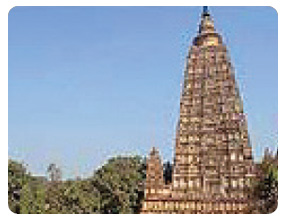 Electricity:
The electrical supply is 220/240V, 50Hz. The connectors
are similar to the European (not British) round pin. Electricity:
The electrical supply is 220/240V, 50Hz. The connectors
are similar to the European (not British) round pin.
Camera Fee: You will have to pay a fee for
using a still and/or a video camera in most monuments,
national parks and game sanctuaries. This fee, which
ranges from Rs 10 to Rs 500, depending on the place
and the type of camera used, is payable at the entrance
gate. Please ensure you carry sufficient funds with
you to cover this charge, as this is NOT included in
the tour price.
Special Permits: Even with a visa foreign nationals
are not allowed everywhere in India. Check with us if
you are planning to journey on your own.
Time: Indian Standard Time (IST) is 5 ? hours
ahead of GMT/UTC, 4 ? hours behind Australian EST and
10 ? hours ahead of American EST.
Travelers Cheques: While one may get the best
rate from a bank, banks have limited opening hours and
one will find the process time consuming and laborious.
You will find that your hotel will encash your checks
and the rate, which is government controlled, is within
reasonable norms. Encashing the cheques in shops will
yield the most unfavorable rate.
Homosexual Travelers: Men holding hands in
public is a sign of affection. Generally, Indian society
does not accept homosexuality, and Indian homosexuals
do not generally declare their orientation. Homosexual
relations between men is illegal in India.
Medical Preparation: We suggest you contact
your personal care physician who will assess your personal
history and advise what you need to take with regard
to preventative medication accordingly.
Disabled Travelers: Very few special arrangements
exist for people with disabilities at airports, railway
stations or hotels. However, people are very helpful,
and if you don't mind receiving their help, then this
will ease your travel difficulties.
Food and Drink: Street food should NOT be consumed.
Do not eat any cold (unprepared food) which has been
prepared previously, such as salads, cut fruit, cut
vegetables. Also do not eat any yogurts or cold milk
products unless they are from an established and good
quality restaurant. Feel free to eat fruit and vegetables
which you peel yourself. Do not drink water from any
source unless it is from a sealed water bottle purchased
from a reputable shop (and NOT from a street vendor).
It is common for street vendors to re-fill discarded
water bottles with normal water. Do not consume any
ice.
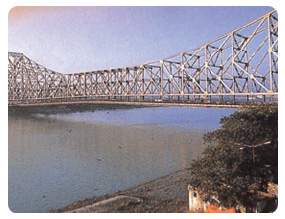 Tipping
and Gratuities: Tipping is an important part of
travel in India. Unless specifically stated, your tour
does not include tipping as we feel that such a personalized
reward is benefactor to you, the traveler. First the
easy part: You do not need to tip regular taxi drivers.
However, you will have a number of other opportunities
of tipping: To your waiters in restaurants, to your
car driver, to your guide and to the bell-hops at the
hotels. For the waiters, leave anything from Rs. 20
to Rs. 100 unless you are a part of a very large group,
in which case the total amount you may wish to leave
behind is Rs. 500 or so. Consider Rs. 100 or so per
day for your car driver. Again if you are in a bus with
a number of other people, this could be increased to
Rs. 200 or so. Bell-hops could be given Rs. 50 (in a
small hotel) to Rs. 100 (in a more grand hotel) per
trip. Tipping
and Gratuities: Tipping is an important part of
travel in India. Unless specifically stated, your tour
does not include tipping as we feel that such a personalized
reward is benefactor to you, the traveler. First the
easy part: You do not need to tip regular taxi drivers.
However, you will have a number of other opportunities
of tipping: To your waiters in restaurants, to your
car driver, to your guide and to the bell-hops at the
hotels. For the waiters, leave anything from Rs. 20
to Rs. 100 unless you are a part of a very large group,
in which case the total amount you may wish to leave
behind is Rs. 500 or so. Consider Rs. 100 or so per
day for your car driver. Again if you are in a bus with
a number of other people, this could be increased to
Rs. 200 or so. Bell-hops could be given Rs. 50 (in a
small hotel) to Rs. 100 (in a more grand hotel) per
trip.
Train Journeys: Your itinerary may include either
a day or an overnight train journey. As you enter the
railroad station, you will be faced (literally!) with
the masses of the Indian populace which will reflect
the entire social status, from the very poor to the
very rich. Study, appreciate and memorialize this experience,
as this is true India, and not what you encounter at
expensive hotels. Your day journey will be in a class
titled "Sitting Chair, AC" which is upright
chairs, where depending on duration of the journey,
you might be served food. Your overnight journey will
be in a class titled: "Two-Tier AC", which
means that you will have reserved accommodation of your
seat within an air-conditioned bogie (rolling stock).
Our representative will show you to your seat. The arrangement
of your Two-Tier AC compartment will be such that there
will be four seats, and these, together with a second
tier mattress, will convert to four beds at night. Keep
your valuables in your largest case and then keep this
case such that it is difficult to remove without waking
you up. Do not show high value equipment to your fellow
passengers. Under no circumstances, accept any food
or drink from your fellow passengers and equally do
not offer your food to any other. This is normal
practice, and no offence will be taken if you decide
to eat or drink without offering to others. Use of a
clean pillow, pillow cover, two sheets and a blanket
for each of you for your overnight journey is included
in your ticket. Use these, and leave them when you disembark.
Feel free to drink water which you buy in sealed bottles
from the on-board train staff. Eat hot food only.
|



